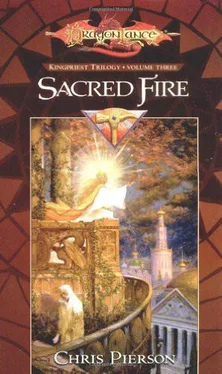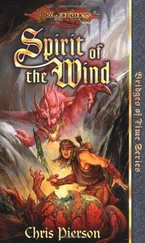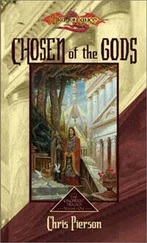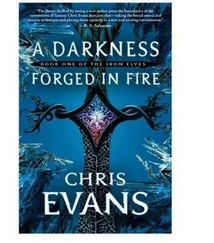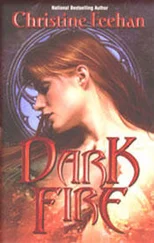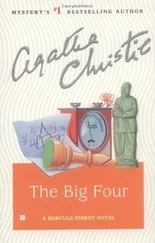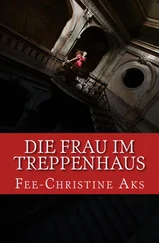Chris Pierson - Sacred Fire
Здесь есть возможность читать онлайн «Chris Pierson - Sacred Fire» весь текст электронной книги совершенно бесплатно (целиком полную версию без сокращений). В некоторых случаях можно слушать аудио, скачать через торрент в формате fb2 и присутствует краткое содержание. Жанр: Фэнтези, на английском языке. Описание произведения, (предисловие) а так же отзывы посетителей доступны на портале библиотеки ЛибКат.
- Название:Sacred Fire
- Автор:
- Жанр:
- Год:неизвестен
- ISBN:нет данных
- Рейтинг книги:4 / 5. Голосов: 1
-
Избранное:Добавить в избранное
- Отзывы:
-
Ваша оценка:
- 80
- 1
- 2
- 3
- 4
- 5
Sacred Fire: краткое содержание, описание и аннотация
Предлагаем к чтению аннотацию, описание, краткое содержание или предисловие (зависит от того, что написал сам автор книги «Sacred Fire»). Если вы не нашли необходимую информацию о книге — напишите в комментариях, мы постараемся отыскать её.
Sacred Fire — читать онлайн бесплатно полную книгу (весь текст) целиком
Ниже представлен текст книги, разбитый по страницам. Система сохранения места последней прочитанной страницы, позволяет с удобством читать онлайн бесплатно книгу «Sacred Fire», без необходимости каждый раз заново искать на чём Вы остановились. Поставьте закладку, и сможете в любой момент перейти на страницу, на которой закончили чтение.
Интервал:
Закладка:
It hurt to think of Rath and Tancred-their bodies burnt by the Hammer along with Idar and his men, then scattered without ceremony as he watched. It hurt worse to think of Wentha, marched out of her home and through the Lordcity in shame, directly to the slave market. She was someone’s property, now-dwelling, if Tithian kept his promise, somewhere far away. That was Cathan’s only solace. When the Kingpriest brought down the gods’ wrath, his sister might survive.
But I will not, he thought I will be here when the hammer falls.
They’d brought him out of the cell once only, blindfolded. He’d known he was bound for the Gapo Furpribon , the Chamber of Interrogation. It was an open, empty room with a dais at one end where three large, gilded chairs looked down upon a pit with iron chains to bind a man to the floor. In the time before the Kingpriests, this had been the supreme place of torture, with all manner of horrific mechanisms and implements to inflict punishment. The church had outlawed such practices when it assumed power; now it belonged to the inquisitors.
When the guards finished shackling him and tore off his blindfold he was greeted by a trio of high priests in robes fringed with crimson. The church no longer had any need for torture. The inquisitors worked in subtler ways, plying him with tainted wine and vapors from a censer they placed at his feet. He didn’t know what drugs they gave him, but they sat there in stony silence, watching him for more than an hour after the guards brought him in. Then they set to work.
“We know about Revando,” they told him. “He is dead. You cannot protect him now. Tell us, who else in the church was a part of this conspiracy?”
“Your sister had many friends in Lattakay. Did she ever speak of others who chose to betray the Lightbringer?”
“What of the magic you used? Where did Revando meet with the wizards?”
“Were there any in the knighthood who belonged to your cause?”
Despite the drags, despite their inuring:, honeyed voices, Cathan did all he could to resist them. He laughed like a madman, sang hymns and children’s songs, spat and cursed and fought his bonds. Even as he did this, he knew it was pointless. He would break; people always broke. He’d seen it many times before. Sometimes it would take a day, even two. Once, a high priest of Morgion had lasted a full week before he lay half-dead and sobbing before the inquisitors-but he bad still answered their questions in the end. The man had died the next day.
Still Cathan fought, though every fiber of his body ached to crumble, to tell them everything they wanted to know. They would break him, but he wouldn’t make it two more. He resisted well, and soon lines of annoyance marked the inquisitors’ stony faces.
“You must tell us what we need to know,” they said.
Cathan spat on the floor.
“Very well,” they said.
A door opened. A figure stepped into the room. He was a tall man, hawk-faced with a shaven head, cloaked completely in red. A large, white eye had been painted on his forehead. Cathan stiffened at the sight of him: He knew at once that the man was an Araifo , and a powerful one at that. He reflexively reached to his chest for the malachite amulet, but it was long gone, taken from him. His mind was open, unguarded. Every single notion in his head lay bare,
The man never said a word, simply looked at him, Cathan pressed his lips together, squeezed his eyes shut, beat his head against the ground, but could not keep out the thought-reader. His stare bored into Cathan; he gazed not just at him but through him. The man’s mind plunged in, pushing through memories and desire fears and regrets, shoving them aside with no effort. There was no pain, though Cathan screamed anyway.
Then it was over. The Araifo’s gaze shifted to the inquisitors. The man shook his head. “He knows nothing important,” he murmured. Then he turned and left.
Cathan lay curled into a ball, whimpering and trembling. The inquisitors regarded him with cold curiosity, like scholars studying an insect
“By order of the Kingpriest, you are Foripon , cast out of the sight of Paladine and the other gods of light,” they informed him. “No one will have you as a slave, and you are too dangerous for the Games, so you will remain here, in our care. Your life will be hard and joyless, but it will be nothing beside what comes after. The Abyss awaits your soul, Cathan Twice-Born.”
He’d passed out then, and awoken back in the black stillness of his cell. And then the dreams came, more vivid than ever, in sleep and waking alike now.
He saw the Lordcity lying like a hoard of jewels on Lake Istar’s northern shore, the air ringing with the sound of voices-thousands of them, raised in prayer, and above them the Kingpriest’s own, calling out from within the crystal dome of the Temple. Calling upon the gods to do his bidding.
The hammer was their answer. It streaked down toward the city, wreathed in flame. The sky above Istar rained fire. The rain fell upon the city, and it burned. The people’s songs turned to shrieks of terror and agony. Cathan watched as walls crumbled, parapets fell, pleasant gardens turned into infernos. Men and women were thrown through the air like broken dolls, ran burning through the streets. The basilica of the Temple burst, flinging shards of crystal into the air. The Lordcity disappeared, utterly destroyed.
The destruction spread, moving across the empire-first the heartland, then the protectorates and provinces. Wave after wave of ruin rippled outward, tearing the land to shreds. Cathan screamed until his throat felt rough as a whetstone, and then his voice splintered and failed him. But no one heard him.
He tried to tell the guards about his dream, those rare times they opened the door. He grabbed at them, babbling about the hammer and the rain of fire and the cracking of the world, but they paid him no heed. The dungeons were full of lunatics, raving that they were Huma Dragonbane resurrected, or foretelling the world’s ending in endlessly imaginative ways. What was one more madman?
“In time, Cathan gave up, and most of the time lay still and silent, even when the guards visited with food. Despair took him. The hammer would fall, and that would be the end. There was nothing left but to wait for death.
“ Palado ,” he murmured in the dark, over and over, “ me paripud. ”
Forgive me.
That’s strange, he thought one day. A visitor.
He was lying on his cot, curled up. He was awake but his eyes were closed, so at first he didn’t see the presence within his cell. Still, he felt the unmistakable sense of another , one who wasn’t a guard. There was light, too-a glimmer that showed red through his eyelids-and an odor, one he’d never expected to smell again. It was so strange, it took him a moment to recognize the attar of roses, sweet and heady, so different from the familiar dankness of the dungeon. And, if anything, the air was warmer than before. A frown worked its way onto his face. Was this some new trick of Fistandantilus?
He let his eyelids crack open. The cell was lit as bright as day, by something akin to the steady gold of sunlight. It stung his eyes, making him draw back against the wall and throw up an arm to ward it off. Slowly, his eyes began to adjust. There was… a tall, slender figure, either human or elf. Blinking, he forced himself to focus, to make out features.
His visitor was a woman of middle age, perhaps ten years younger than him. She wore clerical robes, but in a style that had been outdated for decades: white with purple trim, an amethyst circlet on her brow. Her face was kindly, but at the same time cool, like a marble statue. Her iron-gray hair was pulled back into a tight bun. He recognized her immediately, for he had once known her.
Читать дальшеИнтервал:
Закладка:
Похожие книги на «Sacred Fire»
Представляем Вашему вниманию похожие книги на «Sacred Fire» списком для выбора. Мы отобрали схожую по названию и смыслу литературу в надежде предоставить читателям больше вариантов отыскать новые, интересные, ещё непрочитанные произведения.
Обсуждение, отзывы о книге «Sacred Fire» и просто собственные мнения читателей. Оставьте ваши комментарии, напишите, что Вы думаете о произведении, его смысле или главных героях. Укажите что конкретно понравилось, а что нет, и почему Вы так считаете.
